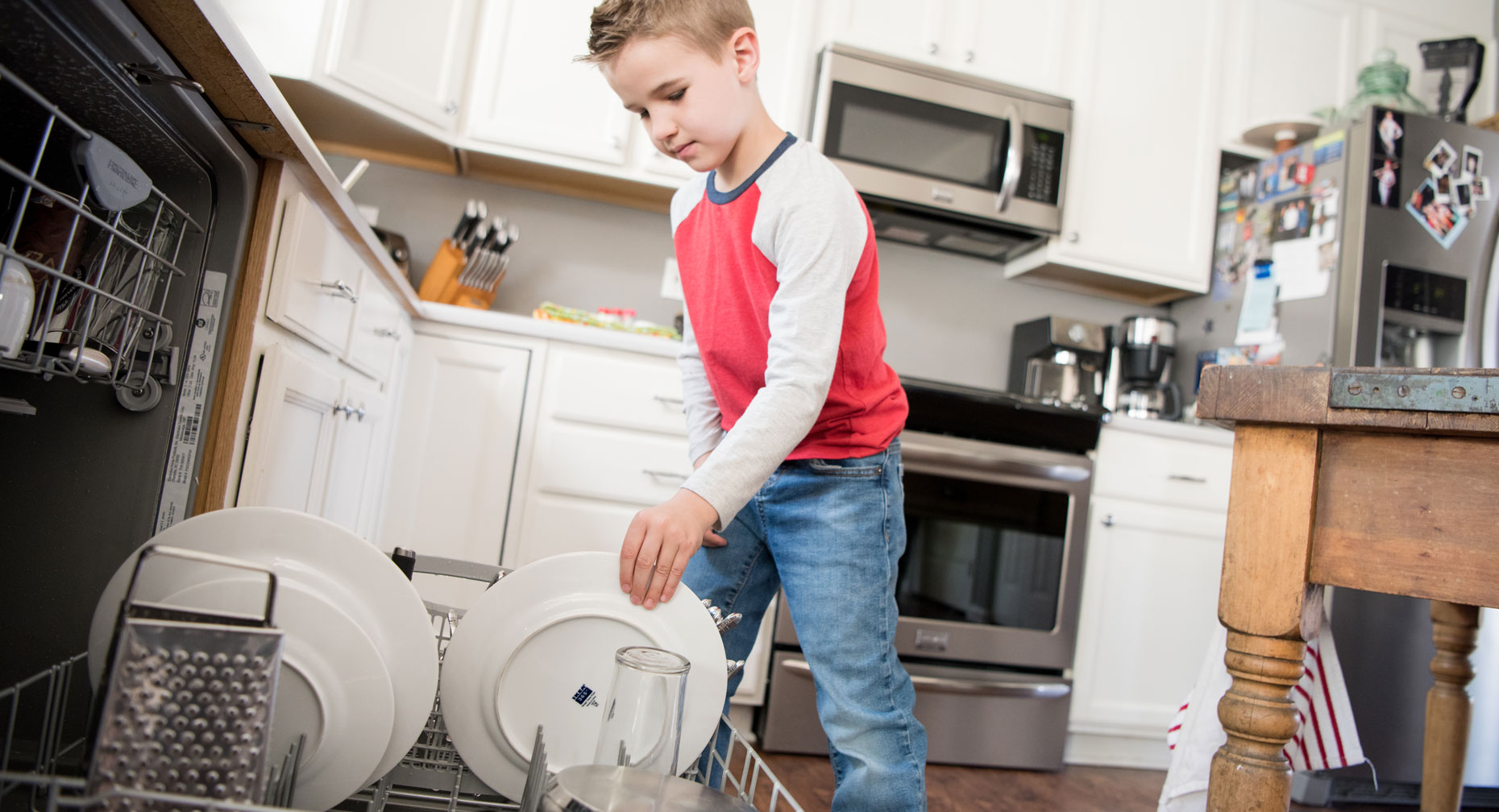11 Ways to Discipline with Love, Not Fear

Answer a few questions and we'll provide you with a list of primary care providers that best fit your needs.
Loving your child means setting rules and limits. After all, that’s what they’ll face when they enter the adult world, and you want them to be prepared.
But most youngsters aren’t naturally disposed to abiding by adult codes of behavior, and their response to rules and limits can frustrate even the most patient parents. This is where love, learning and discipline intertwine.
Parenting experts say that effective discipline requires guiding and redirecting your child with love, not fear. This, by far, is the best way to get the long-term result you desire: a happy, emotionally mature adult who accepts and takes responsibility for his actions and decisions.
“You want to help your child learn self-discipline and self-control,” says Christina Mortsolf, MS, PCC-S, a counselor and program director of Young Children's Assessment & Treatment Services (YCATS) at Samaritan Behavioral Health, Inc. “It’s not that you don’t want there to be consequences, but children should be motivated by factors other than fear and punishment.”
It isn’t easy to discipline with love. When you’re in the heat of the moment with your wild ones, it’s easy to let your frustration dictate how you respond. Before you really “lose it” with them, keep in mind the following advice:
“If we want our kids to learn self-control, we need to model it,” says Mortsolf.
1. Help Them Learn Naturally
Kids learn naturally through their mistakes, according to Mortsolf, so let your child learn for himself what happens if he doesn’t behave (as long as it does not place him or others in danger). This is what’s known as “natural consequences.”
For example, if your child throws and breaks his toy, he’ll no longer be able to play with it. Soon, he’ll learn to take better care of his toys. Or if your child insists on wearing shorts to school on a cold day, he’ll figure out soon enough that bare legs in the middle of winter are not very comfortable. And when he does make these choices, don't give in and rescue him (by buying him a new toy or taking warm pants to school, for example).
“Natural consequences put more control in your child’s hands,” says Mortsolf. “You’re teaching him that the behavior and choices he makes now affects his happiness later on.”
2. Solve the Problem Behind the Problem
Don’t assume that your child is misbehaving or acting out just to annoy you or because he’s a “bad” kid. When kids misbehave, it’s often a symptom of a deeper problem – like needing your attention. If he feels ignored, he may feel that acting out is the only way to get noticed.
Mortsolf recommends playing with your child every day, one-on-one, for 10 to 15 minutes, in non-directed play. By setting aside 15 minutes of unstructured fun time with your child, it may help offset three hours of him hounding you while you’re trying to get something done, says Mortsolf.
Some kids misbehave because they need more time with transitions. So, give him a warning or a heads-up before asking him to do something (“Five more minutes of play, and then we put our toys away” or “Bedtime’s in 15 minutes.”)
3. Focus on the Positive
Mortsolf notes that the behavior that grabs the parent’s attention is what the child is most likely to use again. She calls this the “attention principle.” If the parent only responds to negative behavior (like tantrums), that behavior will increase.
Take notice when your child behaves well, and commend him on his behavior immediately. For example, says Mortsolf, “If he plays nicely for a few minutes independently, point it out and praise him.” This will reinforce the positive behavior (playing well independently), and it will teach him that positive behavior reaps positive attention.
Also, let your child know that you believe his intentions are good, rather than believing the worst of him, adds Mortsolf. Rather than saying, “You never seem to care about your homework and grades,” try “I know that you really want to do a good job at school. Let’s talk about some ideas that might help.”
4. Be Logical About Consequences

Issue consequences that make sense and are appropriate for the situation. And make sure they’re something you’re willing and able to follow through on.
For example, an upset parent may say, “You didn’t pick up your toys, so no play dates for a month!” But the child is likely to forget or slip up before a month is up, because kids “just can’t keep it together that long,” Mortsolf says. (The parent might also forget or give up after a while, as well.) Then, when the child misbehaves again, the frustrated parent usually issues an even stronger consequence (“Okay, two months this time!”) and the struggle escalates.
“A minor consequence will be much more effective in the long run,” she advises.
Also, think ahead and try to turn the situation around. Offer the child a “when-then” option. For example, saying “When you pick up your toys, then you can have a play date” offers a reward for positive behavior. If he doesn’t pick up the toys, there’s a natural consequence: no play time with friends that day.
5. Model Good Behavior
“If we want our kids to learn self-control, we need to model it,” says Mortsolf. “For example, if we scream and yell at other drivers in traffic, we shouldn’t be surprised when our kids push and shove in line at school. The more we model how to respond to disappointment, sadness, boredom, and not getting what we want, that’s when our children learn emotional discipline.”
It can be hard to demonstrate self-control when your kids are testing all your limits. If you feel like you’re about to lose it, tell them, “Mommy is frustrated right now. I’m going to take a deep breath and calm myself down.” Let them know that even parents get frustrated, and show them how you settle yourself with breathing, singing, walking and other calming activities.
6. Teach Your Child Healthy Behavior Habits
Be pro-active by working with your child to create a daily schedule and a list of responsibilities (including a chore chart). This gives them much-needed structure, and a chance to practice self-discipline by completing necessary tasks.
7. Pick Your Battles
If your child throws a few blocks on the floor, it might be best to ignore it. If he tries to push over a bookcase, it’s time to act.
8. Be Firm
Don’t give in. Loving your child means setting rules and limits, because that’s what he’ll face in the real world when he gets older. If your child throws a tantrum because he can't have candy and you give it to him so he will stop, he learns that this is a way to get what he wants.
9. Be Consistent
Children are confused by changes in rules and limitations, and they may push the limits just to find out what those limits really are. Consistency helps them to understand that you are serious about good behavior. Make sure that your rules stay the same from day to day.
10. Be Kind
Remember that the end goal is an emotionally healthy and responsible adult. Don’t scream, call him names or shame him. Give your child a hug when you are done with the discipline.
11. Don’t Spank
The American Academy of Pediatrics strongly advises against spanking, saying it loses its impact after a while, and it increases aggression and anger instead of teaching responsibility. If spanking escalates to a struggle, the child could be physically harmed.
Fear-based discipline simply doesn’t work if you want to raise a healthy, well-adjusted child, says Mortsolf. She points to prisons as an example – prisons often control inmates through fear, not behavior change, which is why so many former prisoners eventually return to a life of crime. Fear-based punishment doesn’t improve behavior in the long run.
“We want to inspire our children to gain our approval,” concludes Mortsolf, and that inspiration doesn’t come from fear. Rather, it comes from discipline that is positive and based on a respectful, healthy relationship between parent and child.
Answer a few questions and we'll provide you with a list of primary care providers that best fit your needs.
Source: National Institutes of Health; healthychildren.org; American Academy of Pediatrics; PBS.org; University of Rochester Medical Center; Christina Mortsolf MS, PCC-S, Samaritan Behavioral Health





